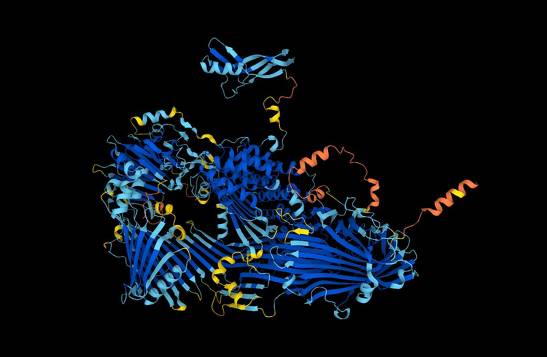For the artificial intelligence (AI)the british company deep mind and the European Bioinformatics Institute of the European Molecular Biology Laboratory (EMBL-EBI) were able to make predictions of the three-dimensional structures of almost all proteins known and cataloged by science to offer them, free and open, in the AlphaFold protein structure database.
This DeepMind tool and database, acquired in turn by Google in 2014, has been developing over the last few years, but what is new now is that it has been scaled up by about 200 times, from nearly a million protein structures to over 200. millions, encompassing almost every organism on Earth whose genome has been sequenced.
This update includes predicted protein structures for a wide range of species, including plants, bacteria, animals and other organisms, opening new avenues of research in the life sciences that will impact global challenges such as sustainability, food shortages and neglected diseases, as announced by EMBL-EBI in one release.
This release will open new avenues of research, such as supporting bioinformatics and computational work, allowing researchers to detect patterns and trends in the database. The predicted protein structures will also be presented in a free central repository of reference data called UniProt (universal protein).
“AlphaFold now offers a 3D view of the protein universe”, highlights Edith Heard, CEO of EMBL. For your part, Demis HassabisDeepMind founder and CEO adds, “We were amazed at how quickly it has become an essential tool for hundreds of thousands of scientists in labs and universities around the world.”
“From fighting disease to plastic pollution, AlphaFold has already made an incredible impact on some of our biggest global challenges,” he adds. Our hope is that this expanded database will help many more scientists in their important work and open up entirely new avenues of discovery.”
An essential tool for science
DeepMind and EMBL-EBI released AlphaFold in July 2021, with over 350,000 protein structure predictions, including the entire human proteome. Subsequent updates allowed for the addition of repositories such as UniProt and 27 new proteomes, 17 of which represent neglected tropical diseases that continue to devastate the lives of over a billion people worldwide.
In just over a year, more than a thousand scientific articles have cited this database and more than 500,000 researchers from more than 190 countries have accessed AlphaFold to view more than two million structures.
The scientific community also took the opportunity to create and adapt tools such as double s from there, which allow users to search for entries similar to a particular protein. The main machine learning ideas behind this artificial intelligence program have also been adopted to develop a list of new algorithms in this space or apply them in areas such as weather prediction. RNA structure or create new protein designs.
Application in many investigations
According to its promoters, AlphaFold has also helped improve our ability to fight plastic pollutionget information about the Parkinson’s diseaseincrease the bee healthI understand how ice is formedapproach neglected diseases such as Chagas disease and leishmaniasis, and explore the human evolution.
“We launched AlphaFold in the hope that other teams could learn and build on the progress we’ve made, and it was exciting to see this happen so quickly. Many other AI research organizations have entered this field and are taking advantage of its advantages to advance even further. It’s truly a new era in structural biology, and AI-based methods will drive incredible progress.” john jumper, scientist responsible for this tool at DeepMind.
“AlphaFold caused a stir in the molecular biology community: just last year, there were more than a thousand scientific articles that used it, I’ve never seen anything like it”, he highlights. Sameer Velankar from the EMBL-EBI, “and this is just the impact of a million predictions, imagine now having more than 200 million protein structure predictions openly accessible in this database.”
DeepMind and EMBL-EBI will continue to update AlphaFold periodically to improve its features and functionality in response to user feedback. Access to the frameworks will remain fully open, under Creative Commons license, and bulk downloads will be available through Google Cloud.
